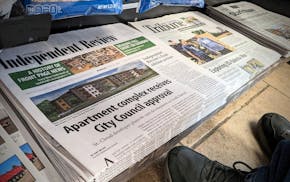Smokers of Camel Lights and Winston Lights should get a chance to argue their fraud case against R.J. Reynolds Tobacco Co. in Hennepin County District Court, a three-judge panel of the state Court of Appeals ruled Tuesday in a decision that also creates an opening for two similar cases against cigarette manufacturers.
The court determined the claims were based on a broad, general duty not to deceive and were not preempted by federal law.
Although the decision comes from the case against R.J. Reynolds, it affects two other cases pending in Hennepin County against other manufacturers of light cigarettes: Philip Morris and Brown & Williamson.
Camel Lights smokers challenged the dismissal of their case by now-retired Hennepin County District Judge Diana Eagon, who barred the claim based on federal law. The smokers argued on appeal that the claims are not preempted by the Federal Cigarette Labeling and Advertising Act or the Federal Trade Commission's oversight of tar and nicotine claims in cigarette advertising.
Gale Pearson is among the lawyers representing the smokers in all three cases. "Basically we're saying: You can't come into our state and lie about your product and get away with it," she said. If the decision had gone the other way, it would have been scary, Pearson said. "If those kind of claims are preempted in this state, we're going to have a tough time enforcing honesty."
The ruling was anticipated nationwide. More than 20 states have lawsuits pending on behalf of the smokers of so-called light cigarettes.
In the case at hand, lead plaintiff Michael Dahl sued in 2003, saying he had smoked two packs of Camel Lights a day for 20 years. He claims the notion that the cigarettes were lighter or lower in tar than regular cigarettes was deceptive and unfair.
The ruling was the first by a state court after conflicting decisions by U.S. circuit courts in Louisiana and Maine. The Louisiana-based decision, issued in February, accepted the cigarette companies' claim that the federal labeling act barred states from adopting laws that affect advertising and promotion based on smoking and health.
But the ruling here adopted the logic used by the First Circuit Court in the case from Maine, decided in August.
Edward L. Sweda Jr., senior attorney for the Tobacco Products Liability Project, a division of the Public Health Advocacy Institute, based at Northeastern University School of Law in Boston, called the ruling "extremely encouraging." The decision will be cited in the other pending cases, he said.
David Howard, a spokesman for R.J. Reynolds, told the Associated Press the company plans to ask the Minnesota Supreme Court to review the decision.
Joining Judge Christopher Dietzen in the decision were Chief Judge Edward Toussaint and Judge Jill Flaskamp Halbrooks. The smokers' claims are not "based on smoking and health," but on a "broader, more general duty to not deceive" so they are not barred by the federal labeling law, Dietzen wrote. Dietzen was appointed to the state Supreme Court last week by Gov. Tim Pawlenty.
Also, because the Federal Trade Commission has never issued a formal rule on cigarette advertising or low-tar claims, they are not barred by the FTC, he said.
A hearing is scheduled later this month in District Judge Robert Blaeser's courtroom on the Brown & Williamson case.
Rochelle Olson • 612-673-1747

Former diversity worker sues University of Minnesota after firing over swastika photo

As longtime Hutchinson, Litchfield papers close, 2 newspapers launch to take their place

In Grand Rapids, Itasca Pride is planning its first event, but there is already pushback
Mother charged with fentanyl overdose death of her 8-month-old boy in Roseville hotel room
